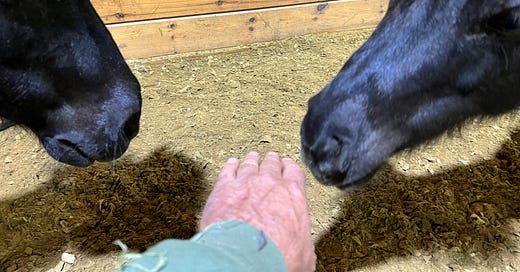In a world characterized by dominance and control, individuals often feel like they either win or lose. This creates a cycle where one becomes a prisoner of the system, or rewarded as the jailer. But is it possible to be both the prisoner and the jailer?
In systems of dominance, two conditions are typically present:
1. Acceptance of the system.
2. A delusion that allows one to perceive themselves as either superior or inferior to another.
In reality, we, the prisoners, often act as our own jailers. We lock ourselves in and then hide the key. Don’t believe it? Try these small experiments: leave your phone off for a day, abstain from your favorite drink for a while, or approach someone you typically avoid.
Or visit a horse farm and ask yourself: "Do the horses have any choices?" Most do not; they are turned out to paddocks based on our decisions, moved or traded according to our whims, and often isolated or placed with horses they dislike, all while being expected to simply "adapt" or "cope."
Horses have been our companions for centuries, yet they exist within a system of dominance. This approach has persisted since Greek times, and even those who identify as “natural horsemen and horsewomen” can resort to force for the desired outcome. When riding, if a horse expresses its opinion, the typical response is to pull on the reins, with the iron bit serving to inflict pain.
Often, trainers suggest employing a method known as "pressure and release" when working with horses. This translates to the concepts of pain and non-pain. While this isn't always the case, it reflects a dominance-based approach.
The very term "trainer" implies a use of dominance and control over these animals. It’s important to acknowledge that we have a responsibility toward domesticated animals, but we shouldn't sugarcoat dominance and coercion as partnership or relationship-building.
It is time to explore alternative models for horse-human relationships.
The consequences of a dominance model are well-known; many of us feel trapped within this system. The horses have almost zero choices. So, where do we begin?
Start by cultivating curiosity. Ask questions and acknowledge that this is the model we've been operating under. Then, consider the possibility that this framework inherently has winners and losers. Instead of thinking of a horse as well-manner, or as a difficult horse, start asking what is the horse trying to say to us.
The greatest horsemen often said when a horse makes a new concept their idea, you did your job.
Camron Adibi is an Equine-Human Behaviorist and a PATH Certified Therapeutic Riding Instructor, holding a master's degree in education from Gordon College. He specializes in guiding children to reconnect with themselves and others through unmounted interactions with horses. By tapping into the emotional intelligence of horses, children cultivate emotional resilience and boost their confidence. They learn to regulate their emotions, trust their instincts, and more comfortably express their true selves. In a calm and supportive environment, children gain a deeper understanding of themselves, develop healthier relationships, and navigate a world that can often feel overwhelming. This work focuses not on riding but on building connection. Through gentle and grounded experiences, children discover their voice, build trust, and step into their full potential. www.camronadibi.com





Agree, unfortunately, we too often "jail ourselves" using our beliefs, views, fears, or more as justification.